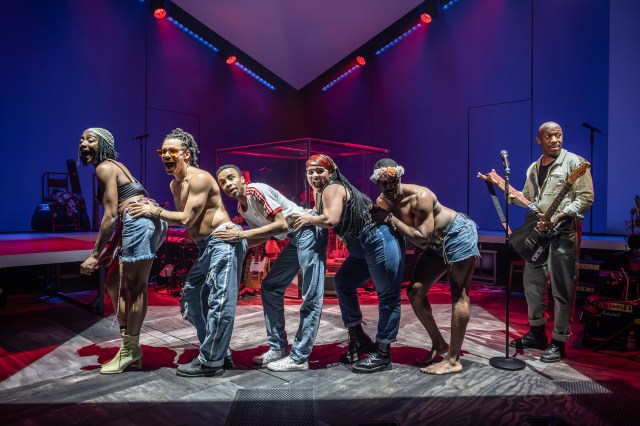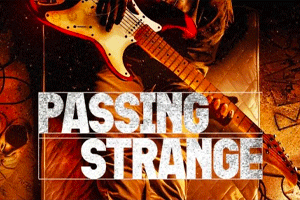
At first it seems, well, strange that this musical about a musician’s inspirations and explorations has taken almost two decades to make its way from Broadway to London. It is so exhilarating and Giles Terera so charismatic as Stew Stewart, the musician who wrote the book and lyrics and makes himself the hero of his own story.
But then it hits its own second act and the energy vanishes like air from a balloon. It’s an enjoyable show but a frustrating one, never quite fulfilling its promise.
It begins with one of its many excellent jokes. On a clever set designed by Ben Stones with a triangular recess and simple platforms and screens, a band and four backing singers wait patiently for the arrival of the star. After three blackouts and much irritation, Terera’s narrator finally strolls on, weighs up the audience and begins to sing.
His collusive relationship with the audience is part of the show’s attraction. He enfolds us in the story with knowing warmth as he begins to sing the tale of a youth growing up in the not-very-mean streets of Los Angeles, where his middle-class mother wants him to accompany her to church. The tale is as old as time, about a boy trying to find what is real and ignoring what matters. Only in this case, it is music that guides him.
The moral – “It’s weird when you wake up in the morning and realise that your entire adult life was based on a decision made by a teenager. A stoned teenager” – is conveyed with wit and feeling in a production directed with sophisticated aplomb by Liesel Tommy, cleverly weaving bonds between Terera’s narration and the action of his life embodied by Keenan Munn-Francis, so that one blends into the other.
The piece is both comment and chronicle, subjective and objective, and all powered by a rich score (co-written by Stew and Heidi Rodewald) that mixes musical styles from the moment the young man is elevated by the gospel choir, through loving funk in Amsterdam and political, radical punk in Berlin as he seeks to find his musical and personal destiny.
Visually, Berlin’s music scene is brilliantly created in Will Duke’s videos and Tom Gibbon’s lighting, with the stage flooding with harsh black and white imagery; the effects of the various drugs the hero experiments with on his long journey to realisation are conjured by trippy effects unfolding behind him.
Musically it reveals the same inventiveness. At one moment, Terera comments that the show needs an “upbeat, gotta leave town kind of show tune but we don’t know how to write those tunes” – and plunges into a take-off of European cinema instead. Choreographically, the fluidity of Dickson Mbi’s movement styles is a gentle delight.
Its energy and unpredictability peak towards the end of the first act where Terera whips up the room into a funky chorus of acceptance and purpose – “it’s all right.” But even after that highpoint, the structural uncertainty shows, as a long bit of plot about falling in love in Amsterdam interrupts the momentum.
It is strange that a show that premiered in 2008 hasn’t been reworked more for this European premiere. It’s got such good will and intelligence, yet it gradually falls apart as the cleverness of the narration recedes and the lessons learnt by a young man on his life’s journey are replaced by platitudes about life and art.
But it has some great notes among the way. Terera is sensational, and so are the band. The cast fling themselves with great heart and terrific voices into multiple roles. David Albury, Nadia Violet Johnson, Renée Lamb, and Caleb Roberts shapeshift wonderfully as the people Munn-Francis encounters; Rachel Adedeji is criminally under-used as the boy’s neglected mother, though her offer of sandwiches to his punk band is very funny – and when she finally sings full out it is a joy.

















